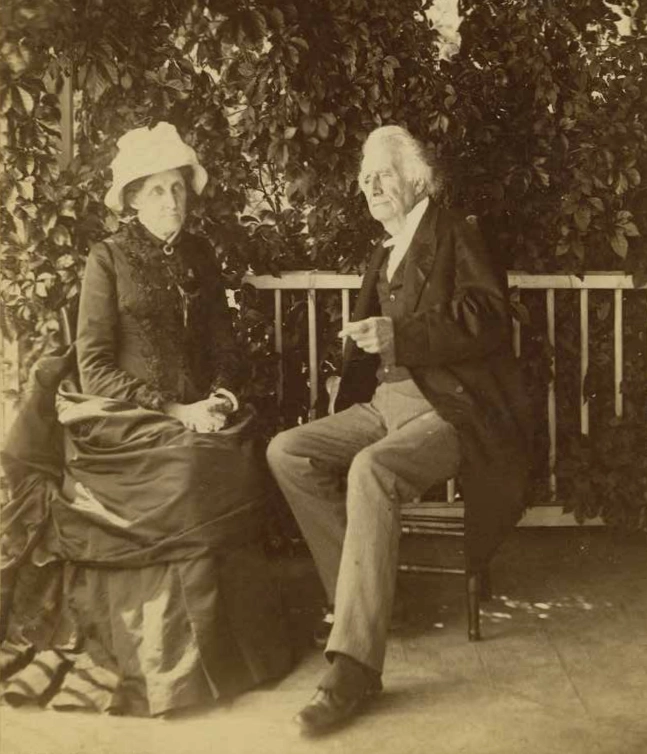Two days later, on March 6, hours before her father’s funeral, Alcott passed away. As word circulated of her last interview with her father, it was hard not to imagine Alcott had accepted her father’s invitation.

During the last summer of her life, Louisa sat for one last photograph. She is seated next to the actor and elocutionist James Edward Murdoch (1811–1893). (Louisa May Alcott Memorial Association)
Between the appearance of Little Women, Part First, until the firm was sold thirty years later, Roberts Brothers published more than 1.7 million copies of Alcott’s books. She had become, by some accounts, the most popular American writer of her generation. Nevertheless, her success was not of the kind she would have wished for herself. Throughout her career, she had been enchanted by the prospect of writing not for profit but for art’s sake, and being acclaimed as something more exalted than a writer for children. Always, however, the mundane business of life and the fear of want had dogged her, thwarting her higher ambitions. The work at which she excelled—writing wholesome stories of childhood and family—seemed paltry to her. But it was a greater talent than she realized. Her children’s novels, and Little Women in particular, are more than genial entertainment. They are companions. Admitting freely that growing up is hard and that not all dreams come true, they illustrate the virtues and teach the values that form the foundations of a life bravely and honorably lived. Alcott’s writings gently affirm that, through kindness, patience, and adherence to duty, one can create a kind of happiness far greater than the indulgence of selfish wants. As a writer, as a person, Louisa May Alcott’s greatest success lay in the invisible gifts she gave to others.
1 Louisa May Alcott, “To Thomas Niles,” mid-July [?] 1868, The Selected Letters of Louisa May Alcott, p. 117.
2 Louisa May Alcott, The Journals of Louisa May Alcott, p. 166.
3 Louisa May Alcott, “Reflections of My Childhood,” in Alcott in Her Own Time, ed. Daniel Shealy, p. 34.
4 Frederick L. H. Willis, Alcott Memoirs, in Alcott in Her Own Time, p. 177.
5 Lurabel Harlow, Louisa May Alcott: A Souvenir, in Alcott in Her Own Time, p. 40.
6 Bessie Holyoke, “[A Visit with Anna Alcott Pratt],” in Alcott in Her Own Time, p. 25.
7 Nina Ames Frey, “Miss Clara and her Friend, Louisa,” in Alcott in Her Own Time, p. 229.
8 Louisa May Alcott, “To Miss Churchill,” 25 December 1878, Selected Letters, p. 232.
9 Louisa May Alcott, Journals, p. 179.
10 Harlow, Alcott in Her Own Time, p. 40.
11 Louisa May Alcott, Journals, p. 171.
12 Louisa May Alcott, “To the Lukens Sisters,” 2 October [1874], Selected Letters, p. 185.
13 Louisa May Alcott, “To Florence Hilton,” 13 March [1874], Selected Letters, p. 182.
14 Louisa May Alcott, “To Maria S.
1 comment